Essay on Computer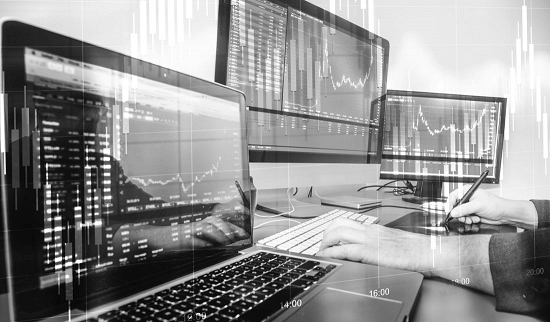
What Exactly is a Computer?Computers are electronic devices that have completely changed how we communicate, work, and live. It is a flexible instrument that can store, retrieve, and analyze enormous volumes of data to turn it into useful information that powers our contemporary society. The computer has evolved into a necessary component of everyday life because of its vast features and capabilities. Data storage is one of a computer's primary purposes. Whether it's a desktop, laptop, or server, these gadgets are furnished with storage media like hard drives or solid-state drives (SSDs) that offer plenty of room to store files, documents, pictures, movies, and other data types. We can maintain our digital life's organization, accessibility, and security thanks to this storage capacity. Computers are also excellent at retrieving data. We may rapidly retrieve any saved information within seconds with only a few clicks or instructions. Computers have eliminated the need to manually search physical files or archives manually, saving us time and effort. Thanks to this capacity to get data quickly, we can quickly discover the data we need, which boosts productivity. The capacity of a computer to process data is by far its most important benefit. Modern computers have enormous processing capabilities due to advancements in microprocessor technology. We can easily do various activities thanks to computers, which run intricate algorithms and computations at astonishing rates. Computers offer the computing power needed for demanding applications, from editing high-resolution photographs and movies to performing simulations and modeling complex systems. A computer offers a wide range of software and apps in addition to its essential tasks that improve our productivity and amusement. For instance, word processing software allows us to write and edit documents, spreadsheets make it possible to organize and analyze data, and presentation software allows us to make engaging presentations that are aesthetically appealing. The ability to play and manipulate media files, including audio, video, and picture files, is another feature of computers. Gamers can access various games, from simple crosswords to virtual worlds with complex graphics. With the help of internet connectivity, we can now access a variety of knowledge and interact with people worldwide. We can explore the enormous world of information, research, communicate online via emails and messaging apps, and keep up with news and happenings using a computer and an internet connection. Because computers can access and use this worldwide network, the Internet has changed how we learn, cooperate, and exchange information. What are the Different Types of Computers?The term "computer" is usually linked to a desktop or laptop computer. And now, computers come in various forms and sizes and perform multiple tasks regularly. We utilize computers when we take cash from an ATM, scan things at the supermarket, or use a calculator. They are of different types and sizes: 1. Desktop Computers 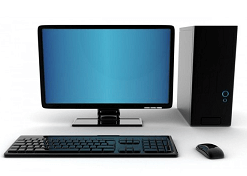
Desktop computers are intended to be placed on a desk and often comprise many components such as the computer chassis, display, keyboard, and mouse. 2. Laptops 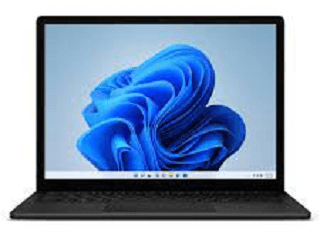
A laptop computer, often known as a laptop or notebook, is the second type of computer you may be familiar with. Laptop computers are portable, battery-powered computers that may be used anywhere. 3. Tablets 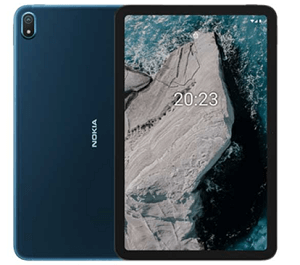
Tablet computers, sometimes referred to as tablets or tabs, are portable computers that are significantly smaller than laptop computers. Rather than a keyboard and mouse, Tablets employ a touch-sensitive screen for typing and navigating. A tablet is similar to an iPad. However, the mouse and keyboards can be connected to them when necessary. 4. Servers 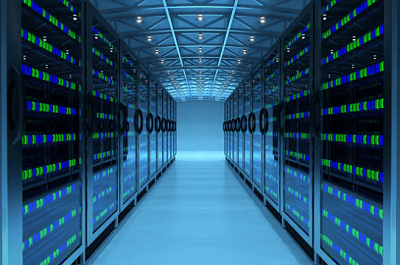
A server is a computer that makes data available to other computers on a network. For example, when you use the Internet, you may look at anything saved on a server. In addition, many businesses employ local file servers to store and distribute data internally. Other Types of ComputersAlthough we don't usually think of them that way, many of today's devices are specialized forms of computers. Here are some instances:
Computers are becoming more prevalent, creating a very effective information system to aid the organization's administration. As a result, it is an essential instrument in every field, including commerce, finance, government, entertainment, daily life, industry, education, and administration. It may be stated that all influential organizations, whether government or commercial, employ computers for numerous daily tasks. It is currently the world's fastest-growing industry. Each company often has one or more major computer systems and multiple microcomputers. The system is an outstanding computer for data processing tasks, and it is used for word processing by many mini microcomputers. Computers have become an indispensable element of our daily lives. History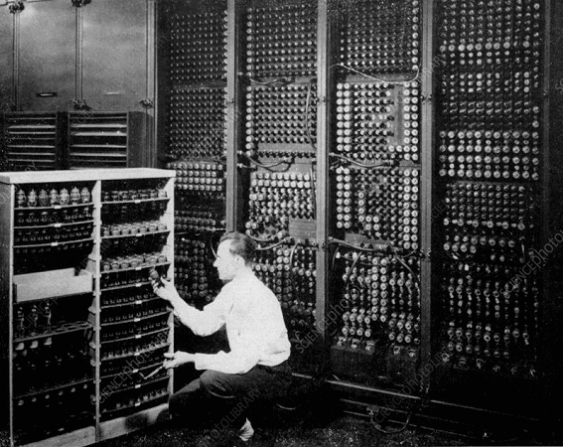
Charles Babbage is known as the "Father of Computers" since he invented the fundamental design of the computer. With his "desire" to create a system capable of doing precise calculations and eliminating miscalculations in course plotting and engineering, he presented the world with the design for his first computer, the Difference Engine. Throughout his existence, computers have undergone many "technical progression." Computers are becoming "smarter" regularly as scientific understanding and technological innovation improve. Science has been at the forefront of technological advancement, allowing computers to progress. Future machines can make their "own judgments with enhanced artificial intelligence." Gradual Developments of Computers Over the Years
Role of Computers in Many Areas of Society1. In Business The use of computers in business is widespread. Because microcomputers are now so inexpensive, small enterprises also utilize computers. Business organizations need to handle many information and figures. Many businesses have begun to utilize computers to calculate wages, identify things sold and still in stock, and create, transmit, or receive corporate statements, letters, invoices, and other papers. It was stated that computers and office technology could assist other managers, clerks, and office automation management. One is a word-processing electronic approach that allows us to create and revise letters, reports, and documents in a fraction of the time it would take to type manually. Many offices generate regular letters such as balance payments, invites, etc. Furthermore, local business organizations utilize computers to generate, preserve and dispatch invoices to certain locations. The benefits of employing computers in this area are undeniably significant in a company organization. 2. In Banking and Financial A company's operational budget manages data from savings accounts, fixed deposits, loans, investments, profitability analysis, etc. Standard and recurring measures are used. As a result, financial institutions are the first to see the benefits of computers in saving time. Computers have made it easier for people to do baking or other financial tasks by themselves. Employee wages will be deposited into the account when employee identification numbers are entered. When purchasing, the money sent into the account will be paid at supermarkets, motels, or petrol stations. A money transfer facility, also known as an electronic money transfer, is a very effective and safe means for financial operations. Individuals can use the ETC capability to issue, transfer, and incorporate cash or checks into their existing balance at any moment. The fundamental purpose of employing computers in financial institutions is to help customers organize their affairs and provide better and more efficient services, to prevent fraud in financial transactions, and remove cash transactions that involve the community to achieve a cashless society. 3. In Education As science and technology improve, the computer may ultimately replace books in the bookstore, disseminating information to the broader public. In other words, computers will change how we learn and store information. In education, various problems such as student registration, class scheduling, examination result processing, and personal storage for students and instructors may be implemented by a computer that can quickly and effectively assist the administration. The computer is now capable of checking and processing exam results. Many institutions now employ computers for office automation, processing, and scientific research outcomes. In truth, classifying books in libraries apply to computer use as well. Research is also essential to ease students' and teachers' teaching and learning, which can be easily performed using computers. 4. In Medical Computers are used in hospitals and clinics to keep patient information, schedule physicians, nurses, and other workers, manage inventory and purchase drugs, conduct medical research, and make medical diagnoses. Using computer-based devices or information technology has also aided clinicians in an illness diagnosis. Among the latest computer technology that supports individuals who are disabled, using computers in the medical industry gives answers to complicated challenges. Microprocessor-based speech systems enable persons with impairments to communicate with a computer by directing it to complete a spoken task. Similarly, advances in computer technology have enabled blind people to see and people who are deaf or hard of hearing to speak indirectly, whether via a voice synthesizer or a keyboard. This can allow them to become more active and perform things they were unable to do previously. Aside from typical data processing, other activities such as patient billing, medical statistics, and staff scheduling have been optimized and automated with computers. Computers can monitor psychological factors such as blood pressure, body temperature, and ECG (Electro-Cardiograph) and sound an alarm if anything odd occurs. The computer examines several variables and compares them to traditional values. If something unusual happens, the computer will alert physicians and nurses by offering a warning. 5. In Legal In recent years, computers have been employed in the legislative process. The most common application is document preparation with a word processor. Computer accounting laws also involve processing to generate weekly and monthly reports, maintaining payment records, consultation, a journal for the most recent attorney information, consumers about the different court proceedings, and storing user records. Because this is a very sophisticated subject, it is necessary to retrieve the relevant information from a law journal, a significant case, scale, and statistics, or critical choices to decide whether to preserve a legal data bank. Thus, having a single computer allows attorneys, trainee lawyers, and law students to discover relevant material faster and provide better service. 6. In Government The government sector is one of the most frequent adopters of computer-assisted administrative procedures. All essential data, such as information on people, services, economic planning, and land development projects, may be obtained quickly for planning and decision making. A computer can now perform long-term weather forecasting. Also, computers help invent various other instruments and equipment. "The success of Neil Armstrong's July 23, 1969 moon landing was also made possible by computers used to build spacecraft, space for astronaut clothing, and flight schedules." This demonstrates the critical use of computers in space transportation. The computer has aided in collecting service and income taxes and keeping track of taxpayers. Those who do it manually can use computers and online services to make the process more efficient and faster. Similarly, computer storage inventory is maintained in the military and other government associations. Computers also track the movement of the adversary in border zones. Traffic flow may be efficiently managed by identifying traffic direction with various detection technologies available on computers. As a result, if more vehicles come from one order, the computer will turn on the green light for a reasonable time. "In the transportation sector, Cosmos-11 was introduced by Mass by giving services for travelers, including those purchasing hotel reservations, to know the status from anywhere in the world." Company owners and automobile registers can also use computers. The computer is used to manage many administrative tasks, and this not only saves time but also makes everything more practical. Computers are also utilized to organize dance, music, and other programs. Each game necessitates mobility. Carefully investigating a physical system is the most incredible way to achieve movement. Computers may also be configured to display high-quality graphics. Drawing on a computer accelerates the creative process. Compared to traditional Kedah, the piece of art may be completed and appraised quickly. Computer-generated cartoon films have become quite popular. 7. In Daily Life Microcomputers are also utilized in the home to control security, air conditioning, and lighting. In addition to budgeting and inventorying at home, home computers enable homemakers to obtain the most recent fashion information and place orders via supermarkets and grocery stores. Users can also access their essential documents using computers via the Internet. This is all due to a microcomputer linked to a national data bank. Children may use computers to learn academic topics or play educational games. However, computers have evolved into information machines in our culture. Future Of ComputersSome exciting possibilities and developments related to computers' future will influence the technological environment. Here are a few crucial places where there will likely be a significant impact:
ConclusionThe fast advancement of science and technology has altered the current pattern of life. Everything, including processing, information collection, and other parts of the many domains previously done manually, which poses many hazards, must be made more effective, faster, and more practical through the use or application of information technology or computer-covering the usage in different domains such as commerce, financial institutions, industry, education, administration, and other areas that each country wishes to expand. In reality, computers have become the heart and backbone of modern civilization. Regardless of the industry, many people are taking up the work of computing. It will aid in the calculation, data storage, decision detection, and increased efficiency and production. However, they stated that it is evident that computers have been extensively practised and used. A computer is a machine in the information society, following globalization and the borderless globe. It is also the primary source of equipment for all machinery administration in any area.
Next TopicPostman Essay
|
 For Videos Join Our Youtube Channel: Join Now
For Videos Join Our Youtube Channel: Join Now
Feedback
- Send your Feedback to [email protected]
Help Others, Please Share









